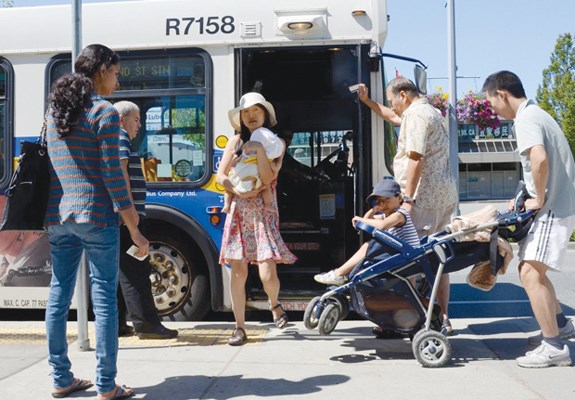Transit riders, cyclists and good old fashioned pedestrians feel they’re healthier than those who rely on their cars to get them around town.
That’s the general findings in the first released segment of Vancouver Coastal Health’s survey called my Health, my Community which covered health and transportation.
The survey, which drew responses from 28,000 Metro Vancouver residents 18 and older indicated 55 per cent of them used their own vehicles to commute to school or work. A total of 29 per cent opted for transit, 10 per cent went by foot, four per cent hopped on a bike, while the remaining two per cent listed “other.”
When it came to how those commuter groups described their health and health behaviour, cyclists and walkers reported they had a positive association with a lower body mass index, and marked high on the survey’s wellness score characterized by a healthy diet, 30 minutes of daily walking, not smoking, and 150-plus minutes of vigorous exercise a week. That group also reported they felt healthy and had a a strong sense of community and belonging.
Transit users scored themselves well on the body mass index, wellness score and 30-minute daily walk category, but did not indicate a self-reported excellent or good response to their own health. They also didn’t have a strong sense of community.
Another category, listed as Active Transportation — those who combine transit, cycling or walking —also put themselves on the lower body mass index scale, wellness score, daily walking and physical activity scales.
The survey also characterized that group as being 33 per cent less likely to be overweight or obese compared to those who commute by car.
The findings are pretty logical, said Richmond’s chief medical health officer, Dr. James Lu.
“It’s not surprising in what people have told us,” Lu said. “I think it’s consistent with the more in-depth research on the way we get to places and how it has an influence on how healthy we are, and how healthy we feel we are.”
Jordan Bateman, who is heading up the “No” campaign on the transit plebiscite said the survey’s release now is a “desperate, cynical attempt” to sway public opinion on a transit plebiscite that wold fund transit improvements through a 0.5 per cent sales tax hike..
Calling the information in the survey highly politicized, Bateman said the “Yes” side has moved towards a campaign of fear.
“You see it with the suggestion from doctors that voting ‘no’ will cause more cancer, fire chiefs saying that if you vote ‘no’ your house might burn down, and that economic disaster is around the corner,” Bateman said. “It’s a desperate attempt to get this tax through.”



